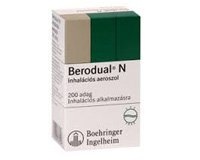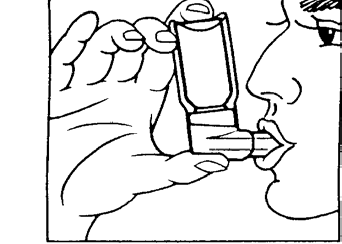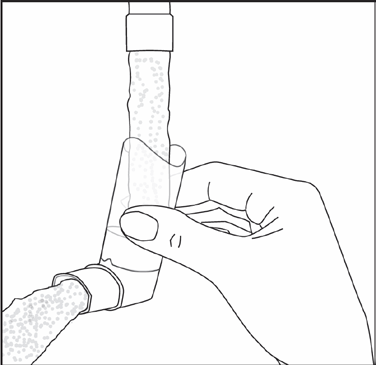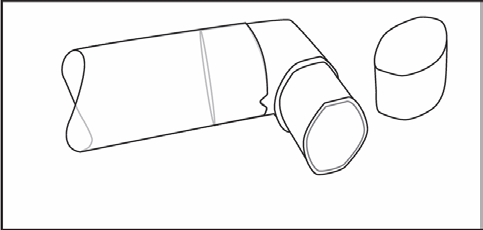

Berodual N

Ask a doctor about a prescription for Berodual N

How to use Berodual N
Leaflet accompanying the packaging: information for the user
Berodual N, (50 micrograms + 21 micrograms)/inhalation dose,
inhalation aerosol, solution
Fenoterol hydrobromide + Ipratropium bromide
You should carefully read the contents of the leaflet before using the medicine, as it contains
important information for the patient.
- You should keep this leaflet, so that you can read it again if you need to.
- In case of any doubts, you should consult a doctor or pharmacist.
- This medicine has been prescribed specifically for you. Do not pass it on to others. The medicine may harm another person, even if their symptoms are the same.
- If the patient experiences any side effects, including any side effects not listed in this leaflet, they should tell their doctor or pharmacist. See section 4.
Contents of the leaflet
- 1. What Berodual N is and what it is used for
- 2. Important information before using Berodual N
- 3. How to use Berodual N
- 4. Possible side effects
- 5. How to store Berodual N
- 6. Contents of the packaging and other information
1. What Berodual N is and what it is used for
Berodual N contains two active substances, fenoterol, which belongs to a group of substances called "selective beta-2-adrenergic receptor agonists" and ipratropium bromide, which belongs to a group of substances called "anticholinergic drugs". Different mechanisms cause both substances to dilate the airways and are therefore used to treat asthma and other inflammatory conditions associated with reversible airway constriction. Berodual N is effective shortly after administration and is therefore used to treat acute asthma attacks.
The medicine is indicated as a bronchodilator in the prevention (prevention) and treatment of symptoms of chronic obstructive airway diseases with reversible bronchospasm: asthma, and in particular chronic bronchitis. If the patient has asthma or chronic obstructive pulmonary disease (COPD), the doctor may prescribe an additional anti-inflammatory medication for the patient, in accordance with current treatment standards for these diseases.
2. Important information before using Berodual N
When not to use Berodual N
- if the patient is allergic to fenoterol hydrobromide, ipratropium bromide, atropine-like substances or any of the other ingredients of this medicine (listed in section 6).
- if the patient has tachyarrhythmia (heart rhythm disorders with accelerated heart activity).
- in patients with a heart disease called hypertrophic obstructive cardiomyopathy.
Warnings and precautions
Before starting treatment with Berodual N, you should discuss it with your doctor or pharmacist:
- in case of sudden bronchospasm after inhalation: you should stop using Berodual N immediately and consult a doctor who will look for
alternative treatment.
- in case of acute, rapidly worsening shortness of breath, the patient should contact their doctor immediately.
- if the patient has narrow-angle glaucoma (increased pressure in the eyeball).
- if the patient notices vision disturbances, such as eye pain or discomfort, blurred vision, halos (ring) or colored images along with eye redness, they should consult an ophthalmologist immediately, as these symptoms may be related to complications (dilated pupils, increased intraocular pressure, narrow-angle glaucoma).
- if the patient has recently had a heart attack (myocardial infarction).
- if the patient has diabetes.
- if the patient has heart or blood vessel disorders.
- if the patient has severe heart disease: they should consult a doctor immediately if they experience chest pain or other symptoms of worsening heart disease.
- if the patient experiences symptoms such as difficulty breathing or chest pain: they should consult a doctor immediately for evaluation, as these symptoms may indicate diseases of both the airways and the heart.
- if the patient has a pheochromocytoma (a type of adrenal gland tumor).
- if the patient has hyperthyroidism (overactive thyroid).
- if the patient has had urinary retention in the past or if it is suspected to have occurred.
- if the patient notices loss of appetite, constipation, water retention or swelling of the legs, irregular pulse or muscle weakness: these may be signs of low potassium levels. Special precautions may be necessary (e.g. blood tests).
- if the patient has cystic fibrosis: gastrointestinal motility disorders may occur.
- if breathing problems persist or worsen: the patient should consult a doctor, as it may be necessary to check the treatment being administered. Additional medications may need to be added to the treatment. The prescribed dose should never be increased, as this can lead to serious side effects.
- if the patient is using other medicines belonging to the group of "selective beta-2-adrenergic receptor agonists"; these medicines should only be used under close medical supervision (see "Berodual N and other medicines").
After using Berodual N, immediate hypersensitivity reactions may occur, such as:
rare cases of urticaria, angioedema (sudden swelling of the throat, skin and mucous membranes of the mouth and throat that can make breathing difficult), rash, bronchospasm, swelling of the mouth and throat and rapidly progressing, life-threatening allergic reactions. If these symptoms occur, you should immediately consult a doctor or hospital.
Particular care should be taken when spraying Berodual N to avoid getting the medicine in the eyes.
If it is necessary to use Berodual N for long-term treatment of asthma, the doctor will recommend using Berodual N only for acute symptoms, and not regularly. If it is necessary to take Berodual N for long-term treatment of mild forms of other conditions with reversible airway constriction, the doctor may recommend using Berodual N only for acute symptoms and irregularly. The doctor may also decide to prescribe additional medication or higher doses of anti-inflammatory medication.
Using Berodual N may lead to positive results for fenoterol in non-clinical tests for substance use, e.g. in the context of improving sports performance (doping).
Berodual N and other medicines
You should tell your doctor about all medicines you are currently taking, or have recently taken, as well as any medicines you plan to take.
Other bronchodilators may enhance the effect of Berodual N. Concomitant use of other beta-2-adrenergic receptor agonists, anticholinergic drugs for oral administration and xanthine derivatives (theophylline) may also enhance side effects. Since the long-term concomitant use of other anticholinergic drugs with Berodual N has not been studied, you should consult your doctor for advice.
Certain medicines used to treat high blood pressure (called "beta-adrenergic blockers") reduce the effect of Berodual N.
Using beta-2-adrenergic agonists, such as those contained in Berodual N, with theophylline, corticosteroids or diuretics (which increase urine production) may cause a decrease in potassium levels, especially in severe asthma. Low potassium levels make the patient prone to irregular heartbeat, especially if they are taking digoxin or if their blood has too little oxygen. In this situation, the doctor may decide to take special precautions (e.g. blood tests).
It is important for the doctor to know if the patient is taking antidepressants (monoamine oxidase inhibitors or tricyclic antidepressants). In such cases, caution should be exercised when using beta-2-adrenergic receptor agonists, as their effect may be enhanced.
Inhalation of halogenated anesthetics, such as halothane, trichloroethylene and enflurane, may enhance the effect of beta-2-adrenergic receptor agonists on the cardiovascular system (i.e. may cause irregular heartbeat).
Pregnancy and breastfeeding
If the patient is pregnant or breastfeeding, thinks they may be pregnant or plans to have a baby, they should consult their doctor or pharmacist before using this medicine.
Although non-clinical studies and human data have not shown a risk to the unborn child for fenoterol hydrobromide or ipratropium bromide, Berodual N should only be used if prescribed by a doctor. This is especially true for the first trimester and immediately before delivery (Berodual N has a tocolytic effect on the uterus).
Non-clinical studies have shown that fenoterol hydrobromide passes into breast milk. It is not known whether ipratropium bromide passes into breast milk. Therefore, Berodual N should only be used during pregnancy and breastfeeding if prescribed by a doctor.
Driving and using machines
No studies have been conducted on the effect of the medicine on the ability to drive and use machines.
During treatment with Berodual N, side effects such as dizziness, tremors, accommodation disorders (vision disturbances), pupil dilation and blurred vision may occur. If the patient experiences any of these side effects, they should avoid performing potentially hazardous activities, such as driving or operating machinery.
Berodual N contains ethanol
This medicine contains 13.313 mg of alcohol (ethanol) in each inhalation. The amount of alcohol in each inhalation of this medicine is equivalent to less than 1 ml of beer or 1 ml of wine.
The small amount of alcohol in this medicine will not have noticeable effects.
3. How to use Berodual N
This medicine should always be used as directed by your doctor. If you are unsure, consult your doctor or pharmacist.
Dosage should be adjusted to individual patient needs. The following dosages are recommended for adults and children over 6 years of age.
Acute asthma attacks
2 inhalations are usually sufficient to immediately relieve symptoms.
In more severe cases, where no significant improvement in breathing is observed after 5 minutes, an additional 2 inhalations may be used.
If the asthma attack does not subside after 4 inhalations, it may be necessary to use a larger number of inhalations. In this case, the patient should consult a doctor or the nearest hospital immediately.
Periodic and long-term treatment
One dose is 1 or 2 inhalations, up to a maximum of 8 inhalations per day (on average 1 or 2 inhalations 3 times a day). In the treatment of asthma, Berodual N should only be used as needed.
The medicine can only be used in children on the advice of a doctor and under adult supervision.
Method of administration
Before first use, the following rules should be observed:
Remove the protective cap and press the dosing valve twice.
During each use of the medicine, the following rules should be observed:
- 1. Remove the protective cap. If the medicine has not been used for more than three days, before the next use, the dosing valve should be activated by pressing it once.
- 2. Take a deep breath out.
- 3. Holding the aerosol container in the position shown in Fig. 1, place your lips on the mouthpiece. The arrow and the bottom of the container should be pointing upwards.

(Fig. 1)
- 4. Take a deep breath in, while pressing the bottom of the container, which will release one dose. Hold your breath for a few seconds, then remove the mouthpiece from your mouth and breathe out. Repeat these steps for the second inhalation.
- 5. After use, replace the protective cap.
The container is not transparent, so it is not possible to check if it is empty. A new container contains 200 inhalation doses (inhalations). After using all the doses in the container, a small amount of solution may still be present. However, the inhaler should be replaced with a new one, as further use may not ensure the delivery of the correct dose of the medicine.
The contents of the aerosol container can be estimated as follows: shaking the container will indicate whether there is still solution present.
The mouthpiece of the inhaler should be cleaned at least once a week. It is important to keep the mouthpiece of the inhaler clean to ensure that the medicine does not accumulate on the walls of the mouthpiece and block the use of the inhaler. Before cleaning the mouthpiece, the protective cap should be removed and the medicine container removed from the inhaler. The mouthpiece should be rinsed with warm water until all visible impurities are removed.

(Fig. 2)
After cleaning, shake the mouthpiece and leave it to air dry. Do not use
any drying devices. When the mouthpiece of the inhaler is dry, the medicine container and protective cap should be put back in place.

(Fig. 3)
WARNING:
The plastic mouthpiece has been designed for use with Berodual N, inhalation aerosol, solution, so that the patient receives the correct dose of the medicine. It should not be used to inhale any other inhalation aerosol, and similarly, Berodual N, inhalation aerosol, solution should not be used with any other mouthpiece than the one provided with this medicine.
The container containing the medicine is under pressure and should never be opened or exposed to temperatures above 50 °C.
Using more than the recommended dose of Berodual N
In case of using more than the recommended dose of Berodual N, you should immediately consult a doctor or pharmacist.
Symptoms of overdose are mainly related to the effect of fenoterol hydrobromide and include:
tachycardia (accelerated heart activity), palpitations, tremors, increased or decreased blood pressure, increased difference between systolic and diastolic blood pressure, angina pectoris (chest pain), arrhythmias, decreased diastolic blood pressure, excitement, mental disorders, increased intraocular pressure, glaucoma, accommodation disorders, dilated pupils, blurred vision, eye pain, conjunctival hyperemia, and eyelid edema.
Metabolic acidosis (acid-base balance disorders in the body) and hypokalemia (decreased potassium levels in the blood) have also been observed during the use of fenoterol in doses higher than recommended for approved indications of Berodual N.
Potential symptoms of ipratropium bromide overdose (such as dryness of the oral mucosa, accommodation disorders) are mild.
Missing a dose of Berodual N
If the patient has been prescribed Berodual N for regular use and misses a dose, they should take it as soon as possible, but should not take a double dose to make up for the missed dose. Then, they should take the next dose at the usual time.
Stopping treatment with Berodual N
If the patient stops using Berodual N, breathing problems may recur, and even worsen. Therefore, Berodual N should be used for as long as the doctor recommends. Before stopping treatment with Berodual N, the patient should consult their doctor.
In case of any further doubts about the use of this medicine, the patient should consult their doctor or pharmacist.
4. Possible side effects
Like all medicines, this medicine can cause side effects, although not everybody gets them.
After using Berodual N, immediate hypersensitivity reactions may occur, such as:
rare cases of urticaria, angioedema (sudden swelling of the throat, skin and mucous membranes of the mouth and throat that can make breathing difficult), rash, bronchospasm, swelling of the mouth and throat and rapidly progressing, life-threatening allergic reactions. If these symptoms occur, you should immediately consult a doctor or hospital.
Similar to other inhaled medicines, Berodual N may cause local irritation. The most common side effects reported during clinical trials are:
cough, dry mouth, headache, tremors, pharyngitis, nausea, dizziness, dysphonia (voice disorders), tachycardia (accelerated heart activity), palpitations, vomiting, increased systolic blood pressure and nervousness.
Common (may occur in less than 1 in 10 people)
- cough
Uncommon (may occur in less than 1 in 100 people)
- rapid heartbeat
- accelerated pulse
- palpitations
- increased systolic blood pressure
- muscle tremors
- nervousness
- headache
- dizziness
- local irritation, such as pharyngitis
- voice disorders
- dry mouth
- nausea
- vomiting
Rare (may occur in less than 1 in 1000 people)
- life-threatening allergic reactions (anaphylactic)
- hypersensitivity (allergic reactions)
- low potassium levels
- irregular heartbeat
- atrial fibrillation (very rapid irregular heart rhythm)
- supraventricular tachycardia (abnormal rapid heart rhythm)
- insufficient blood flow to the heart muscle
- decreased diastolic blood pressure
- excitement
- mental disorders
- increased intraocular pressure
- glaucoma
- accommodation disorders
- dilated pupils
- blurred vision
- eye pain
- conjunctival hyperemia
- eyelid edema
- halo vision (ring)
- pharyngitis
- bronchospasm
- throat swelling (pharyngeal edema)
- sudden laryngospasm (may affect breathing and speech)
- paradoxical bronchospasm (inhalation-induced bronchospasm)
- dry throat
- stomatitis
- glossitis
- diarrhea associated with gastrointestinal motility disorders
- constipation
- mouth swelling
- skin rash
- urticaria
- pruritus
- angioedema (rapidly progressing swelling of the skin or mucous membranes, which can cause breathing difficulties)
- excessive sweating
- muscle pain
- muscle cramps
- muscle weakness
- urinary retention
Reporting side effects
If you experience any side effects, including any side effects not listed in the leaflet, you should tell your doctor or pharmacist, or nurse. Side effects can be reported directly to the Department of Drug Safety Monitoring of the Office for Registration of Medicinal Products, Medical Devices and Biocidal Products: Al. Jerozolimskie 181C, 02-222 Warsaw, tel.: 22 49-21-301, fax: 22 49-21-309,
website: https://smz.ezdrowie.gov.pl.
Side effects can also be reported to the marketing authorization holder. By reporting side effects, you can help provide more information on the safety of this medicine.
5. How to store Berodual N
The medicine should be stored out of sight and reach of children.
Store at a temperature below 25°C.
Protect from direct sunlight, heating, freezing.
Do not use the medicine after the expiry date stated on the packaging after: EXP.
The expiry date refers to the last day of the month stated.
Medicines should not be disposed of via wastewater or household waste. You should ask your pharmacist how to dispose of medicines that are no longer needed. This will help protect the environment.
6. Contents of the packaging and other information
What Berodual N contains
- The active substances of the medicine are: fenoterol hydrobromide and ipratropium bromide. One inhalation dose contains 50 micrograms of fenoterol hydrobromide (Fenoterol hydrobromide) and 21 micrograms of ipratropium bromide monohydrate (Ipratropium bromide), which corresponds to 20 micrograms of anhydrous ipratropium bromide.
- The other ingredients (excipients) are: anhydrous citric acid, purified water, anhydrous ethanol, 1,1,1,2-tetrafluoroethane.
This medicine contains fluorinated greenhouse gases.
Each inhaler contains 10.16 g of HFA 134a (1,1,1,2-tetrafluoroethane), which corresponds to 0.01453 tons of CO2 equivalent (GWP = 1430).
What Berodual N looks like and contents of the pack
Packaging: stainless steel container, dosing valve and mouthpiece in a cardboard box
Pack size: one inhalation aerosol
The container contains 200 inhalation doses.
Marketing authorization holder and manufacturer
Marketing authorization holder
Boehringer Ingelheim International GmbH
Binger Strasse 173
D-55216 Ingelheim/Rhein
Germany
Manufacturer
Boehringer Ingelheim Pharma GmbH & Co. KG
Binger Strasse 173
55216 Ingelheim am Rhein
Germany
To obtain more detailed information, you should contact the representative of the marketing authorization holder:
Boehringer Ingelheim Sp. z o.o.
Tel: +48 22 699 0 699
Date of last revision of the leaflet:
-----------------------------------------------------------------------------------------------------------------
Information intended for healthcare professionals only:
Overdose
Symptoms
Symptoms of overdose are mainly related to the effect of fenoterol hydrobromide. Potential symptoms of overdose due to excessive beta-adrenergic stimulation include:
tachycardia, palpitations, tremors, increased or decreased blood pressure, increased difference between systolic and diastolic blood pressure, angina pectoris, arrhythmias, and flushing of the face. Metabolic acidosis and hypokalemia have also been observed during the use of fenoterol in doses higher than recommended for approved indications of Berodual N.
Potential symptoms of ipratropium bromide overdose (such as dryness of the oral mucosa, accommodation disorders) are mild, as the systemic bioavailability of inhaled ipratropium is very low.
Treatment
Berodual N treatment should be discontinued. Monitoring of acid-base balance and electrolytes should be considered.
Sedatives should be administered, and in severe cases, intensive therapy should be provided.
Beta-adrenergic receptor blockers can be used as specific antidotes, preferably beta-selective ones, but with caution, considering the potential decrease in bronchodilation and careful dose adjustment in patients with asthma or chronic obstructive pulmonary disease due to the risk of severe bronchospasm, which can be fatal.
- Country of registration
- Active substance
- Prescription requiredYes
- Manufacturer
- ImporterBoehringer Ingelheim Pharma GmbH & Co. KG
- This information is for reference only and does not constitute medical advice. Always consult a licensed doctor before taking any medication. Oladoctor is not responsible for medical decisions based on this content.
- Alternatives to Berodual NDosage form: Solution, (0.5 mg + 0.25 mg)/mlActive substance: fenoterol and ipratropium bromideManufacturer: Instituto De Angeli S.r.l.Prescription requiredDosage form: Solution, (0.5 mg + 0.25 mg)/mlActive substance: fenoterol and ipratropium bromidePrescription requiredDosage form: Solution, (0.5 mg + 1.25 mg)/4 mlActive substance: fenoterol and ipratropium bromidePrescription required
Alternatives to Berodual N in other countries
The best alternatives with the same active ingredient and therapeutic effect.
Alternative to Berodual N in Ukraine
Alternative to Berodual N in Spain
Online doctors for Berodual N
Discuss dosage, side effects, interactions, contraindications, and prescription renewal for Berodual N – subject to medical assessment and local rules.














